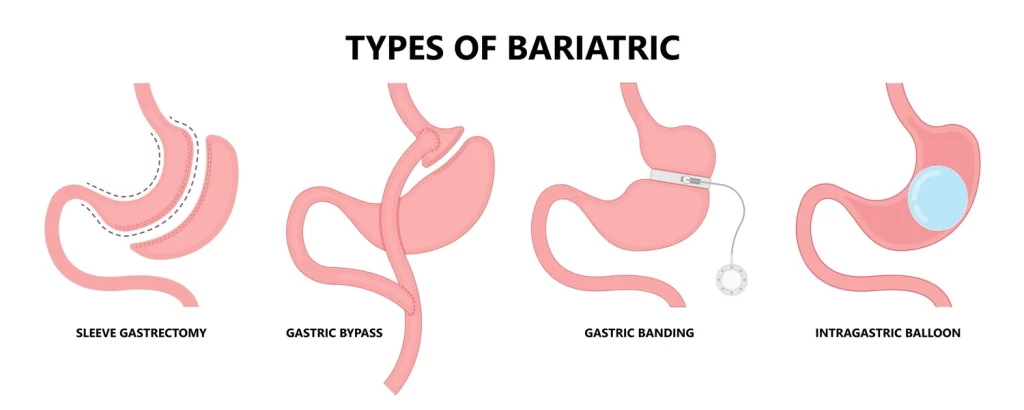Barlborough
| Procedure | Price |
|---|---|
| Gastric sleeve surgery | £8399 |
| Mini-gastric bypass surgery | £9449 |
Mr Peter Vasas
Consultant General Surgeon

Mr Peter Vasas
Consultant General Surgeon

Bariatric surgery is designed to help patients with obesity lose weight while improving health and quality of life. Private procedures at Practice Plus Group include gastric sleeve surgery and mini-gastric bypass surgery. They typically involve 1–2 days in hospital with gradual recovery and dietary adjustments.
| Procedure | Price |
|---|---|
| Gastric sleeve surgery | £8399 |
| Mini-gastric bypass surgery | £9449 |
| Procedure | Price |
|---|---|
| Gastric sleeve surgery | £8399 |
| Mini-gastric bypass surgery | £9449 |
Bariatric surgery (sometimes referred to as weight loss surgery) is a surgical procedure that helps people lose weight by making changes to their stomach and/or digestive system. It is usually only considered when other weight loss methods, such as diet and exercise, haven’t worked, and when obesity poses a serious health risk.
There are a few different types of weight loss surgery available. The right treatment for you will depend on your individual health needs. Talk to your doctor or surgeon to find the right approach for you.
Two of the most common procedures, and ones we provide at Practice Plus Group, include:
Bariatric sleeve gastrectomy surgery is designed to help people with obesity lose weight by reducing the size of their stomach. This surgical procedure involves the removal of around 75-80% of the stomach, leaving behind a sleeve-shaped tube or pouch. The surgery restricts the amount of food the stomach can hold and alters the production of certain hormones related to hunger.
This results in patients feeling fuller after a smaller amount of food, as well as a decrease in appetite.
Gastric bypass is a type of weight loss surgery that involves creating a smaller stomach pouch and rerouting the digestive tract to promote weight loss.
Like gastric sleeve surgery, this treatment results in patients feeling fuller after smaller meals. It is a less complex procedure than a traditional gastric bypass.

Bariatric surgery is intended for people who have tried other weight loss strategies (such as diet and exercise) without success. You may also qualify if you're at risk of other health complications due to obesity.
The criteria for being eligible for weight loss surgery can vary, but commonly includes:
To undergo surgery, you will also need to agree to make life-long healthier lifestyle changes to maintain the weight loss, such as changes to your eating habits and exercise regime.
Calculate your BMI: Weight (kg) ÷ Height (m)2.
Weight loss surgery has helped many people regain their independence, return to their favourite activities and lead a healthier, happier life.
Benefits include:
Weight loss surgery carries a low risk of complications and side effects 1. Possible risks include:
Before surgery, your surgeon will talk to you about all the risks involved and you can ask questions. If you experience any worrying symptoms after surgery, it’s important to speak to your medical team straight away.

The cost for private bariatric surgery in the UK ranges from around £8,000 to £15,000, depending on the procedure chosen and the provider.
At Practice Plus Group, we’re proud to offer affordable, transparent pricing without any hidden costs.
Our prices are:
The price, plus £95 for the consultation, covers a pre-operative assessment, and any necessary tests.
There are 3 ways to access weight loss surgery at Practice Plus Group:
NHS waiting times for bariatric surgery can vary depending on the type of treatment and your location and can range from several months to over a year.
At Practice Plus Group, we're proud to offer short waiting times to our patients.
Below, we explore what to expect each stage of the bariatric procedure.
Before surgery, you will be booked in for an initial consultation. You’ll meet your dedicated surgeon and anaesthetist and have any necessary tests, including x-rays and blood tests. This is your opportunity to talk about your general health and medical history, ask questions and prepare yourself for the procedure.
Once you have had your initial consultation with the surgeon, you will be booked in for a consultation with our dietician to fully understand your history and reasons for wanting the surgery. Once weight loss surgery is deemed appropriate for you, you will be booked in for a full nurse/anaesthetic review, at this stage we would need to access to your past medical history from your GP, then the surgery will be booked.
Your healthcare team may provide you with a preoperative diet plan to help reduce the size of your liver and prepare your body for surgery. This often involves a period of low-calorie consumption.
It’s helpful to start making healthy lifestyle changes a few weeks or months before surgery to prepare yourself for the life-long adjustments. This includes stopping smoking, eating a healthier diet and increasing your physical activity.
Before surgery, it’s a good idea to prepare your home so it’s suitable for your recovery and arrange for someone to collect you from hospital.
You may be asked to refrain from eating or drinking for several hours before surgery.
For the surgery, you will be put to sleep under general anaesthetic. The procedure will usually take between 1 and 3 hours.
The procedure will be performed as keyhole surgery (where the surgeon makes smaller incisions through which to pass through a small camera and surgical instruments) or open surgery.
For gastric sleeve surgery, the surgeon will remove around 75-80% of your stomach, leaving behind a sleeve-shaped tube or pouch.
For mini bypass surgery, the surgeon will create a smaller stomach pouch using surgical staples. This is then connected to part of the small intestine, allowing food to bypass a portion of the stomach and the upper part of the small intestine.
After the surgery, you will spend some time in hospital for monitoring and initial recovery. The length of your hospital stay can vary but is typically 1 to 2 days, depending on the type of surgery.
You should be able to resume normal activities after six weeks. However, you may experience symptoms such as tiredness, mood changes or hair loss in the first six months as your body adapts. Most people continue losing weight for two years post-surgery.
Pain and discomfort are common after surgery, and pain management strategies will be given. This may include medication, and the surgical team will provide instructions on how to manage pain at home.
In the days following surgery, you will be encouraged to start moving and walking to prevent blood clots and promote circulation. However, strenuous physical activity will be limited during the initial recovery period.
Bariatric surgery patients usually follow a gradual progression in their diet. This typically starts with clear liquids and then advances to pureed and soft foods before reintroducing a regular diet. The specific diet plan will be provided by the healthcare team. You may require nutritional supplements, including vitamins and minerals, to prevent deficiencies. Your healthcare team will provide guidance on the appropriate supplements and their dosages.
Adopting and maintaining healthy lifestyle changes is crucial for long-term success after bariatric surgery. This includes dietary modifications, regular physical activity and other recommended behaviours.
Bariatric surgery is not a one-time event; it requires lifelong follow-up. Regular check-ups with your bariatric team will help monitor your weight loss progress, address any issues and provide ongoing support.
At Practice Plus Group, you can choose an experienced consultant to support you throughout your time with us, ensuring you receive first-class care.
You can search for consultants on our website by treatment, language or name.
At our hospital in Barlborough any patient in need of our services is welcome, regardless of location, even if you have an existing health condition, as long as it’s safe for us to treat you.
If you’re ready to experience life to the fullest and improve your long term health, get in touch to see if weight loss surgery is the right option for you.
Still have questions about private weight loss surgery in the UK? Take a look at our most frequently asked questions below or contact our team for more information.
While discomfort and pain are normal after any surgical procedure, the pain should be manageable. Pain is most acute during the initial days after surgery and gradually diminishes as the healing process progresses. Your healthcare team will provide you with pain management methods and strategies.
Bariatric surgery isn’t a suitable option for everyone. You may not be eligible if:
Weight loss after bariatric surgery varies from person to person and is influenced by your adherence to postoperative guidelines and the lifestyle changes you make.
If you lose more than 50% of your excess weight and it doesn’t come back, the surgery will be classed as a success. In general, weight loss is faster after gastric bypass and sleeve gastrectomy surgery, with most of the weight lost within the first 6 months and stabilising after 12-18 months.
The National Bariatric Surgery Registry reported that the average excess weight patients lost after 1 year was approximately 60-65% for sleeve gastrectomy and 70-75% for gastric bypass.
Every surgical procedure comes with its own risks and potential complications. Sleeve gastrectomy and mini bypass procedures are common and have a low chance of complications. Always talk to your doctor or surgeon about the risks involved.
Private bariatric surgery is available to anyone who meets the eligibility requirements mentioned above and wants to pay for themselves or use private health insurance. The benefits of opting for private care include a shorter wait for surgery and the ability to choose your hospital and operation date.
After bariatric surgery, you will need to adopt new eating habits to support weight loss and overall health. While the definition of “normal” eating may change post-surgery, many people can enjoy a varied and satisfying diet with certain modifications.
Portion control is crucial after bariatric surgery. The reduced stomach capacity limits the amount of food that can be consumed at one time. Eating small, nutrient-dense meals is a common practice.
Bariatric surgery can impact nutrient absorption. Therefore, you may need to take vitamin and mineral supplements, such as calcium, vitamin D, B vitamins, and iron, to prevent deficiencies.
Carbonated beverages, high-sugar foods, and high-fat foods are often advised against.
Depending on the type of treatment you have and your individual recovery timeline, you will likely need to stay in hospital between 1-3 days.
Depending on the type of surgery you have, the procedure will usually take between 1-3 hours.

5,000+

treatments carried out last month
Outstanding

or 'Good' ratings by CQC
100%

clean record for hospital acquired infections
97%

of patients recommend Practice Plus Group
Affordable options for funding your own treatment.
With our option of paying for yourself you’ll get high quality, consultant-delivered care without the unnecessary extras. It’s excellent value for money, with no compromise on clinical outcomes.
Hassle free treatment for patients with private medical insurance.
Whether you have your own private health insurance or are covered through your employer, receive expert hospital treatment at Practice Plus Group.
Free high quality healthcare with short waiting times.
Did you know you can choose where you have your free NHS hospital treatment? If you or a loved one needs to see an NHS specialist, you can choose to access Practice Plus Group Hospitals as an NHS patient.